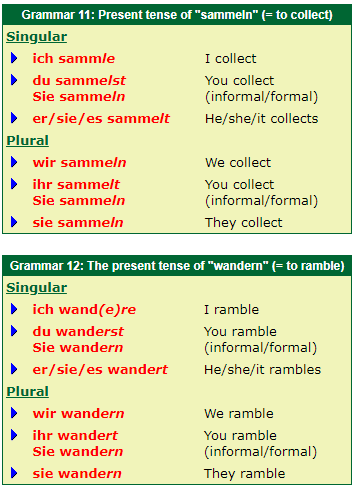Verbs whose stem ends in "-el" and "-er"
Regular verbs whose stem ends in "-el" or "-er" differ from the general pattern of present tense endings in the following respects:
The infinitive of such verbs ends in "-n", not "-en".
The first and third person plural of the present tense, along with the polite "Sie" form, also end in "-n", not "-en".
In the "ich" form of the present tense, the "-e-" of the stem is always dropped with verbs in "-el" - e.g. ich sammle. This "-e-" is also occasionally dropped with verbs ending in "-er", although this is more common in spoken German than in written German - e.g. ich wand(e)re.
Here is the present tense of two such verbs which we have encountered in this chapter: sammeln (= to collect) and wandern (= to ramble; to hike).
 英语
英语 日语
日语 韩语
韩语 法语
法语 西班牙语
西班牙语 意大利语
意大利语 阿拉伯语
阿拉伯语 葡萄牙语
葡萄牙语 越南语
越南语 俄语
俄语 芬兰语
芬兰语 泰语
泰语 丹麦语
丹麦语 对外汉语
对外汉语

